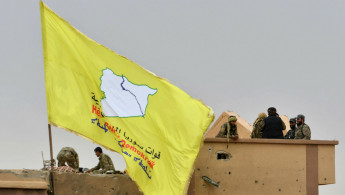Arab tribal council accuses Kurdish-dominated authorities of 'starvation policies' in eastern Syria
The "Arab Council in Al Jazeera and Al Furat" issued a statement via its spokesman, Ahmad Jarba, a prominent figure in the Syrian opposition who once led the Syrian National Coalition and is himself a member of the Shammar tribe.
The statement accused the Kurdish-dominated Autonomous Administration of North and East Syria, also known as Rojava, of exploiting the region’s resources without regard for its "infrastructure" or "alleviating the poverty of its residents".
The statement added that local farmers were being forced to sell their produce at extremely low rates and said that the authorities were now governing the area unilaterally, leaving residents no stake in governance.
The SDF – the official military force of Rojava - control nearly a third of Syria, but unlike the provinces of Raqqa and Hassakeh in the north that have largely Kurdish populations, Deir az-Zour in the east is almost purely Arab.
The latest development is a sign of increasing ethnic tensions between Arab tribesmen and the SDF, who appear to have failed to win the hearts and minds of residents in the region, which suffers from a lack of services, rising crime, fuel shortages and anger over what they see as growing Kurdish influence.
Local tribesmen protested last year in areas liberated from IS, accusing Kurdish fighters of selling oil to Syrian President Bashar al-Assad’s loyalists amid severe fuel shortages in government-held parts of the country.
Read more: Kurdish militia filmed beating up hospital staff in eastern Syria
Since the SDF began capturing part of Deir az-Zour in 2017, residents have expressed anger at what they see as the forced recruitment of Arabs into the SDF, as well as the detention of many on suspicion of link to IS.
In January, SDF militia allegedly stormed a hospital in the Deir az-Zour town of al-Kasrah, beating up several of its workers, including doctors, nurses, and other staff, sparking protests among Arab tribesmen.
Agencies contributed to this report.
Follow us on Facebook, Twitter and Instagram to stay connected





 Follow the Middle East's top stories in English at The New Arab on Google News
Follow the Middle East's top stories in English at The New Arab on Google News


